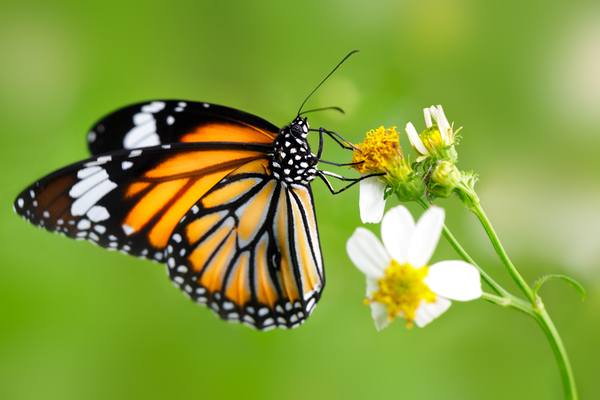Do insects hibernate? If not, then what do they do? They don't just disappear only to reappear again in the spring. All species adapt to deal with the cold weather in some way.
 Photo by: Shutterstock
Photo by: Shutterstock
When winter arrives, birds fly south and bears go into hibernation, but what about bugs?
We've previously covered what happens to termites in the winter and what climate change means for bugs, but now let's take a look at insect behavior during the colder months and how to prevent pest problems in the winter.
INSECTS WHO DON'T HIBERNATE MIGRATE.
Well, some do and some don't. Some go south just like birds do. Monarch butterflies, for instance, travel from east of the Rocky Mountains all the way down to central Mexico. Meanwhile, those west of the Rockies fly to Santa Barbara, California. Those same insects even return next year, making them true migration pros.
WHAT HAPPENS TO BUGS THAT DON'T MIGRATE OR HIBERNATE?
Some insects, like crickets, die in the winter and leave only their eggs behind. So the crickets you hear chirping in the fall won't be around come spring. Each female lays 150–400 eggs, and they can live a little longer if they find their way indoors, usually through cracked foundations or poorly sealed doors and windows. Once inside, they can do some damage by feeding on fabric, paper, wool or linen — not to mention their consistent chirping noises.
WHAT KINDS OF BUGS HIBERNATE?
Yellowjackets, paper wasps and some mosquitoes find a protected spot to become dormant in until warm weather activates them. Another form of hibernation is forming a cocoon. For example, moths that form cocoons in the fall need that period of winter cold, since they likely won't complete their development in a warmer climate.
Ants also slow down during the winter. Before the cold hits, ants consume more food to put on fat. Then their body temperatures drop and they become sluggish. They find warm spots under rocks or tree bark, huddle around the queen and feed off the fats, carbohydrates and proteins they stored up in the fall.
WHERE DO OTHER INSECTS GO IN WINTER?
Unfortunately, many insects such as cockroaches, scorpions and spiders move in with humans for the colder months. They find shelter in wall voids, attics and other places in man-made structures. Those in the wilderness opt for hollow logs and other natural cavities. Some bugs, like spiders, live with humans year-round, but you may notice them more during the winter since they go out looking for mates during this time.
WHICH INSECTS DON'T HIBERNATE?
The annoyingly persistent silverfish is active all year round. They can even live for up to three years, with females laying one to three eggs a day. That's why it's important to rid your home of the infestation early. Silverfish are attracted to high humidity and eat paper products and synthetic fibers.
HOW CAN I HELP PREVENT BUGS FROM GETTING INSIDE THE HOUSE?
Seal up all potential points of entry around your home. Clean up debris like dead grass and fallen leaves near your foundation, as these can make attractive hiding places for bugs. Also, store firewood several feet from the house. Remove food odors by moving garbage cans and grills further from your home. Keep the area around your house dry by monitoring leaky pipes, and watch out for lights, which attract night-flying insects that can slip into your home.
Whether you notice silverfish, cockroaches, spiders or scorpions in your home during the winter, call Terminix®. You can also sign up for a fast, free quote online by clicking here. Don't let pests into your home, no matter the season.



